| zip | elle | 24 | langblr español | principal @zipquips |
Don't wanna be here? Send us removal request.
Text
una frase por dia | viernes, el tercero de enero

¡hola! ha pasado mucho tiempo desde la última vez que publiqué ;-; pero, ahora es un año nuevo y una de mis resoluciones es aprender español de nuevo :)
hoy fue un día raro porque dormí hasta 3pm, lmao. mi mamá me despertó temprano a 7am pero no dormí bueno antes eso, entonces dormí mucho y entonces fue 3pm.

cosas hice practicar/aprender español:
un lecciones de duolingo (racha de tres días)
escribí este post

inglés bajo:
a phrase a day | friday, the 3rd of january

hi! a lot of time as passed since the last time i posted ;-; but, now it is a new year and one of my resolutions is to learn spanish again :)
today was a weird day because i slept until 3pm, lmao. my mom woke me up early at 7am but i didn't sleep well before this, so i slept more and then it was 3pm.

things i did to practice/learn spanish:
a duolingo lesson (3-day streak)
wrote this post
#una frase por día de zip#español#spanish langblr#spanish#spanish language#diario#diario digital#spanish practice#correcciones bienvenidas
5 notes
·
View notes
Text
239/365 - Canciones que siempre me encantan
youtube
2 notes
·
View notes
Text
238/365 - Canciones que siempre me encantan
youtube
2 notes
·
View notes
Text
234/365
¿Cuáles son algunos de sus dichos/modismos/refranes/citas favoritos?
Aquí está un buen sitio para descubir algunos.
2 notes
·
View notes
Text
una frase por día | viernes, el veintiuno de junio
hoy, me desperté muy tarde (alrededor de la una) porque pospuse mi alarma muchas veces. comí el desayuno y vi una parte de una película (pacific rim) con un amigo :) por ahora, la película es muy divertida e interesante. ¡me gustan muchos de los personajes!
mi mamá ha estado enferma entonces cuidé de ella. (su enfermedad no es muy mala, pero pienso que es demasiado complicado explicar en español y también no quiero decir todo el internet sobre la enfermedad de mi madre, lmao)

cosas hice practicar/aprender español:
un par de lecciones de duolingo (racha de dos días)
escribí este post
jugué pokemon shining pearl en español por cinco minutos porque estaba cansade

inglés bajo:
a phrase a day | friday, june 21st
today, i woke up very late (around 1pm) because i snoozed my alarm a bunch of times. i ate breakfast and watched part of a movie (pacific rim) with a friend :) so far, the movie is very fun and interesting. i like many of the characters!
my mom has been sick so i took care of her. (her illness isn't very bad, but i think it's too complicated to explain in spanish and i also don't want to tell all of the internet about my mom's illness, lmao)

things i did to practice/learn spanish:
a couple of duolingo lessons (2 day streak)
wrote this post
played pokemon shining pearl in spanish for 5 minutes because i was tired
#una frase por día de zip#español#spanish langblr#spanish#spanish language#diario#diario digital#spanish practice
2 notes
·
View notes
Text
Baldur's Gate 3 - Non-binary Translation in Spanish
A while back I had mentioned that when I learned how to change language settings for Baldur's Gate 3, I was curious to learn how they would adapt the non-binary [no binario] option into Spanish since Spanish (like many Romance Languages) is very gendered
What I saw actually surprised me a bit
Usually in game translations with different genders, English tends to treat you as a "they" even though it's usually male or female; and in Spanish most of the lines are gendered, or phrased in a very ambiguous way in translation like speaking of your character as una persona "a person" rather than "he" or "she", or "they"
This is one of the first times I've seen the gender neutral -e endings used in an official setting
-
For the purposes of this, and any future posts on this, I decided I would try to play as a non-binary gnome cleric. I should also mention that when you start up the game in Spanish and you do the character customization, everything starts you with the base word (i.e. masculine by default, or possibly agender but looks masculine)... as in you can choose to be elfo "elf", semielfo "half-elf", humano "human", semiorco "half-orc"... choose between bárbaro "barbarian", mago "wizard", brujo "warlock" and so on
My default character creation screen read gnomo, clérigo for "gnome cleric"
But the way your character is addressed by others is what changes
The first NPC you interact with is "Us" a little brain thing you can choose to help. If you do it calls you "friend":
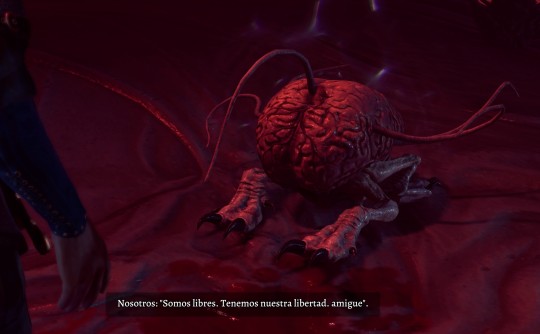
Nosotros: Somos libres. Tenemos nuestra libertad. amigue Us: We are free. We have our freedom. Friend [nb].
The word used is amigue
For the sake of understanding Spanish grammar, you probably know amigo/a "friend". The G here is a hard G. The gender neutral ending is E... but the combination of GE is pronounced like an H sound in Spanish [la gelatina "gelatin" for example is like "hel-a-ti-na"]. To preserve that hard G sound, you have to add a UE to it... so amigo/a becomes amigue for non-binary
[if you study Spanish this is the exact same grammar you'll see in turning -gar verbs into subjunctive forms; why pagar would turn to pague]
The next person you come across is Lae'zel:
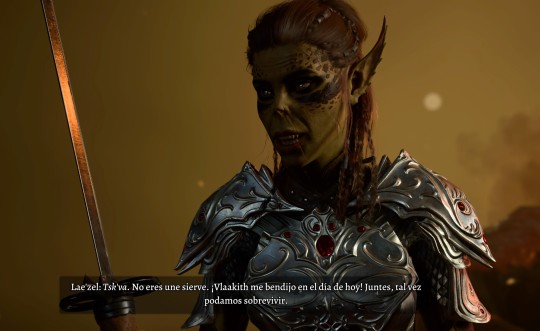
Lae'zel: Tsk'va. No eres une sierve. ¡Vlaakith me bendijo en el día de hoy! Juntes, tal vez podamos sobrevivir. Lae'zel: Tsk'va. You are no thrall [nb]. Vlaakith blessed me today ["on this day of today"; emphatic]. Together [nb plural], we may (yet) survive.
Interestingly, there's first siervo/a meaning "servant" or "serf" or "thrall"
What I found very interesting was that you have une... un and una being "a" are used for indefinite articles; the non-binary form seems to be une
What threw me off though was seeing juntes... now junto/a is "together" [lit. "joined"] but juntes implies a non-binary plural.
I don't know if this is because in Spanish grammar it would imply that non-binary trumps feminine [the way amigos "friends" could be male+female or multiple male, as opposed to amigas "friends" being all female]... or if it's maybe an error or something else; the game treats Lae'zel as a woman in every other regard so I think it's the first one which is a situation I somehow hadn't considered. I had just assumed it would be juntos ...or juntas if you played female
Next I decided to rescue Gale first because he uses a lot of adjectives/professions and I wanted to see what they looked like:

Gale: No serás clérigue por casualidad, ¿verdad? ¿Médique? ¿Cirujane? ¿Increíblemente hábil con una aguja de tejer? Gale: You wouldn't happen to be a cleric, right? A doctor/medic? Surgeon? Unbelievably skilled with a knitting needle?
First is clérigo/a "cleric" being used in non-binary as clérigue. Similarly we have médique which is the non-binary médico/a for "medical doctor"
[just like above C turned to QUE to preserve a hard C/K sound; you'll see this with subjunctive and even preterites of -car verbs... why atacar "to attack" will turn to ataqué "I attacked" and ataque in subjunctive... because CE has a soft S sound in Latin America, and can be lisped in Spain]
And next is cirujane... the word cirujano/a is "surgeon"
Finally important note - hábil being "able" or "skilled" is a unisex adjective, so there is no change in any gender - masculine, feminine, or non-binary
*Note: I did miss it but at some point someone used the article le to describe my character. The el and la "the" are the masculine and feminine definite articles; le is non-binary "the" which still catches me by surprise because it looks French to me
-
I've been told since I made the original post that people have seen the non-binary E ending used in other things, but this was special for me to see. I'm curious how the other gendered languages available treated non-binary options
It was a fun surprise for me, especially for some modern day Spanish linguistics in a VERY big modern game, with non-binary word choices being heavily prominent. It's a bit of a learning experience for me
If I find any more fun examples of NB language being used I'll let y'all know as I go
766 notes
·
View notes
Text
Websites to learn languages by reading
Hyplern
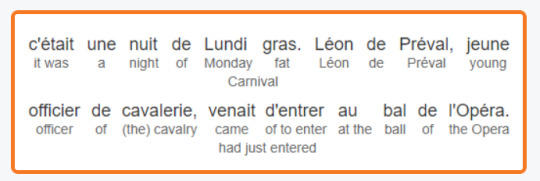
Language Crush
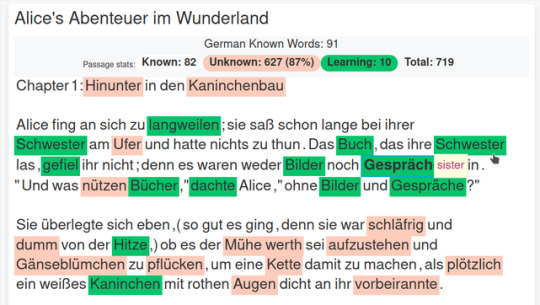
Readlang
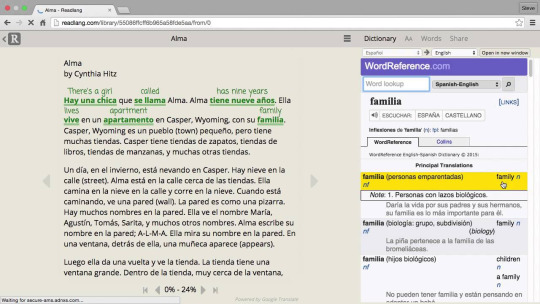
Vocab Tracker

11K notes
·
View notes
Text
Duolingo Alternatives by Language
Disclaimer: I haven't used or tested all of them. All resources have different strengths, e.g. Drops being designed for vocabulary. They often aren't full alternatives for Duolingo or formal classes. I just wanted to compile resources for all languages on Duolingo to make the switch easier, especially for the less popular languages.
Feel free to also check out my collection of free textbooks
If you want a more detailed resource list for any of these languages (or perhaps one not listed here) you can send me an ask and I can see what I can do.
Arabic
AlifBee
Arabic Unlocked
Beelinguapp
Bluebird
Busuu
Clozemaster
Drops
Infinite Arabic
Ling
LinGo Play
LingQ
Mango
Mondly
Qlango
Write It! Arabic
Catalan
Bluebird
Clozemaster
Drops
Ling
LinGo Play
LingQ
LyricsTraining
Mondly
Qlango
Chinese
Bluebird
Beelinguapp
Bunpo
Busuu
Chineasy
Clozemaster
Drops
Du Chinese
Hello Chinese
HeyChina
Immersive Chinese
Infinite Chinese
Ling
Lingodeer
LinGo Play
Lingopie
LingQ
Mango
Mondly
Pleco Chinese Dictionary
Qlango
Czech
Bluebird
Clozemaster
Ling
LinGo Play
Mango
Mondly
Qlango
Danish
Babbel
Bluebird
Clozemaster
Drops
Ling
LinGo Play
Lingvist
LingQ
Mango
Mondly
Qlango
Dutch
Babbel
Bluebird
Busuu
Clozemaster
Drops
Ling
LinGo Play
Lingvist
LingQ
LyricsTraining
Mango
Mondly
Say Something in Dutch
Qlango
Esperanto
Clozemaster
Drops
Esperanto12.net
Kurso de Esperanto
LingQ
Qlango
Finnish
Bluebird
Clozemaster
Drops
Ling
LinGo Play
LingQ
LyricsTraining
Mango
Mondly
Qlango
French
Babbel
Bluebird
Beelinguapp
Bunpo
Busuu
Clozemaster
Collins French Dictionary
Conjuu
Dr French
Drops
HeyFrance
Infinite French
Lilata
Ling
Linga
Lingodeer
LinGo Play
Lingopie
Lingvist
LingQ
Listen Up
LyricsTraining
Mango
Mondly
Nextlingua
Oxford French Dictionary
Qlango
TV5MONDE
Xeropan
German
Babbel
Bluebird
Beelinguapp
Bunpo
Busuu
Clozemaster
Collins German Dictionary
Conjuu
Drops
DW Learn German
Infinite German
Ling
Linga
Lingodeer
Lingopie
LinGo Play
Lingvist
LingQ
LyricsTraining
Mango
Mondly
Nextlingua
Oxford German Dictionary
Qlango
Xeropan
Greek
Bluebird
Clozemaster
Drops
Greek Alphabet Academy
Ling
LinGo Play
LingQ
Mango
Mondly
Qlango
Write It! Greek
Guaraní
Clozemaster
Guarani Ayvu
Haitian Creole
Bluebird
Mango
Hawaiian
Drops
Mango
ʻŌlelo Online
Hebrew
Bluebird
Clozemaster
Drops
Ling
LinGo Play
LingQ
Mango
Mondly
Shepha
Write It! Hebrew
High Valyrian
Valyrian Dictionary
Hindi
Bhasha
Bluebird
Beelinguapp
Clozemaster
Drops
Hindwi Dictionary
Ling
LinGo Play
LingQ
Mango
Mondly
Qlango
Hungarian
Bluebird
Clozemaster
Drops
Ling
LinGo Play
LingQ
Mango
Mondly
Qlango
Indonesian
Babbel
Bluebird
Clozemaster
Drops
Ling
LinGo Play
LingQ
Mango
Mondly
Irish
Bluebird
Clozemaster
Collins Irish Dictionary
Drops
Easy Irish
Ling
Mango
Teanglann
Italian
Babbel
Beelinguapp
Bluebird
Bunpo
Busuu
Clozemaster
Collins Italian Dictionary
Conjuu
Drops
Infinite Italian
Ling
Linga
Lingodeer
Lingopie
LinGo Play
Lingvist
LingQ
LyricsTraining
Mango
Mondly
Nextlingua
Oxford Italian Dictionary
Qlango
Japanese
Beelinguapp
Bluebird
Bunpo
Busuu
Clozemaster
Drops
HeyJapan
Hiragana Quest
Infinite Japanese
kawaiiDungeon
Ling
Lingodeer
Lingopie
Lingvist
LingQ
LyricsTraining
Mango
Mondly
Oyomi Japanese Reader
renshuu
Takoboto Japanese Dictionary
Todaii
Qlango
Write It! Japanese
Klingon
boQwl! Klingon Language
Klingon Translator
Write It! Klingon
Korean
Beelinguapp
Bluebird
Bunpo
Busuu
Clozemaster
Drops
Hangul Quest
HeyKorea
Infinite Korean
Ling
LinGo Play
Lingopie
Lingodeer
Lingvist
LingQ
Mango
Mondly
Qlango
Write It! Korean
Latin
Bluebird
Cattus
Clozemaster
Collins Latin Dictionary
Grammaticus Maximus
Latinia
Legentibus
LingQ
Mango
Mondly
Perdisco
Qlango
Vice Verba
Navajo
Navajo Language Renaissance
Navajo Language Program
Speak Navajo
Norwegian
Babbel
Bluebird
Clozemaster
Drops
Ling
LinGo Play
Lingvist
LingQ
Mango
Mondly
Mjolnir Norwegian
Norskappen
Qlango
Polish
Babbel
Bluebird
Busuu
Clozemaster
Drops
Ling
LinGo Play
Lingvist
LingQ
LyricsTraining
Mango
Mondly
Qlango
Portuguese
Babbel
Beelinguapp
Bluebird
Bunpo
Busuu
Clozemaster
Collins Portuguese Dictionary
Drops
Infinite Portuguese
Ling
Lingodeer
Lingopie
LinGo Play
Lingvist
LingQ
LyricsTraining
Mango
Mondly
Nextlingua
Qlango
Romanian
Bluebird
Clozemaster
Drops
Ling
LinGo Play
LingQ
Mango
Mondly
Qlango
Russian
Babbel
Bluebird
Beelinguapp
Busuu
Clozemaster
Collins Russian Dictionary
Drops
Infinite Russian
Ling
Linga
LinGo Play
Lingopie
Lingodeer
Lingvist
LingQ
Mango
Mondly
Nextlingua
Qlango
Write It! Russian
Scottish Gaelic
Bluebird
Clozemaster
Go!Gaelic
Mango
Spanish
Babbel
Beelinguapp
Bluebird
Bunpo
Busuu
Clozemaster
Collins Spanish Dictionary
ConjuGato
Conjuu
Drops
Infinite Spanish
Ling
Linga
Lingodeer
LinGo Play
Lingvist
LingQ
Listen Up
LyricsTraining
Mango
Mondly
Nextlingua
Say Something in Spanish
SpanishDict
Qlango
Xeropan
Swahili
Bluebird
Bui Bui Swahili App
Clozemaster
Drops
Ling
LinGo Play
LingQ
Mango
Nkenne
Swedish
Babbel
Beelinguapp
Bluebird
Clozemaster
Drops
Ling
LinGo Play
Lingvist
LingQ
LyricsTraining
Mango
Mondly
Qlango
Turkish
Babbel
Beelinguapp
Bluebird
Busuu
Clozemaster
Drops
Ling
LinGo Play
LingQ
LyricsTraining
Mango
Mondly
Qlango
Ukrainian
Bluebird
Clozemaster
Drops
Ling
LinGo Play
LingQ
Mango
Mondly
Mova Ukrainian
Qlango
Speak Ukrainian
Vietnamese
Bluebird
Clozemaster
Collins Vietnamese Dictionary
Drops
Learn Vietnamese with Annie
Ling
Lingodeer
LinGo Play
Mango
Mondly
Welsh
BBc Cymru Fyw
Bluebird
Clozemaster
Say Something in Welsh
Yiddish
Bluebird
Clozemaster
Mango
Proste Yiddish
Roni Gal Learn Yiddish
Vaybertaytsh
Yiddish Book Center
Zulu
Bluebird
Nkenne
Bonus: Polygloss which claims to be available for all languages as long as there is another user also learning the same language
7K notes
·
View notes
Text
224/365
¿Eres expert@ de Angry Birds?* Aprender sobre aspectos de la trama y tratar de explicar la trama de Angry Birds en una infografía.
*No es necesario ser expert@ verdader@, sólo tienes que ser un poco familiar con el juego
2 notes
·
View notes
Text
una frase por día | viernes, el catorce de junio
hoy fue un día de recuperación para mí. esta semana fue muy ocupada y lleno de momentos difíciles. dormí hasta tarde y tuve una mañana lenta. también, pasé mucho tiempo con mi perro :)
también, pensé más sobre mi horario de aprender de los idiomas. intereso en aprender español (obviamente), griego y ASL (lenguaje gestual americano). tres idiomas son un montón (y ya estoy sacrificando gaélico ;-;) y no quiero aprender sólo un idioma porque todos son importantes para mí
por lo tanto, cada día:
haré una lección de duolingo para el español y el griego. para ASL, haré una lección con una app diferente que tiene una estructura similar
escucharé un episodio de un podcast para cada idioma (excluyendo ASL, lmao)
estudiaré cada idioma con un libro de texto o un video para veinte minutos
continuaré escribir sobre mi día en español y escribir en griego cuando estoy listo
esto probablemente estará difícil al principio pero tengo esperanza que esto estará fácil

cosas hice practicar/aprender español:
una lección de duolingo (racha de tres días)
escribí este post
jugué pokémon shining pearl en español por una hora

inglés bajo:
a frase a day | june 6th
today was a recovery day for me. this week was very busy and full of difficult moments. i slept in late and had a slow morning. i also spent a lot of time with my dog :)
i also thought a lot about my language learning schedule. i'm interested in learning spanish (obviously), greek, and ASL (american sign language). three languages is a lot (and i'm already sacrificing gaeilge ;-;) and i don't want to learn only one language since they're all important to me
therefore, each day i will:
do a lesson on duolingo for spanish and greek. for ASL, i'll do a lesson on a different app that has a similar structure
listen to a podcast episode for each language (excluding ASL, lmao)
study each language with a textbook or video for twenty minutes
continue to write about my day in spanish and write in greek when i'm ready
this will probably be difficult at first but i have hope that this will become easy

things i did to practice/learn spanish:
a duolingo lesson (three day streak)
wrote this post
played pokemon shining pearl in spanish for an hour
#una frase por día de zip#español#spanish langblr#spanish#spanish language#langblr#diario#diario digital#learning spanish
5 notes
·
View notes
Text
The Spanish Imperfect Tense

The imperfect past tense of indicative is one of the verb tenses that can be most difficult for learners of Spanish when they are not native speakers of a Romance language such as French or Italian. In particular, the difficulty lies in differentiating it from the preterite (indefinido). Today we will look at some ways of understanding it.
1. The tree
This proposal comes from the teacher Clara Urbano Lira, and consists in considering the difference between the indefinido and the imperfect as if it were a tree. When telling a story, we will use both verb tenses, but the indefinido will represent the trunk and the branches, the fundamental part of the story, while the imperfect will be something like the leaves and the fruits or flowers, the details that make the anecdote richer and more complex, but which do not really advance the plot.
For example: En 2008 entré (ind) a la universidad. Era (imp) un lugar muy grande y podía (imp) perderme fácilmente. Tuve (ind) muy buenos profesores, compañeros muy interesantes, y crecí (ind) mucho como persona. Había (imp) muchos árboles en el campus, y la biblioteca era (imp) muy bonita, pasaba (imp) mucho tiempo leyendo allí. En mi segundo año conocí (ind) a Ernesto y caí (ind) completamente enamorada. Era (imp) un chico muy inteligente y simpático. Nos volvimos (ind) novios y tras terminar nuestros estudios decidimos (ind) casarnos.
If you notice, all the sentences with the imperfect add details, but we could take them out and we would still tell a story with the indefinido sentences: a very simple story, but one that moves forward in the end.
2. The imperfect is a present in the past.
In an article aimed at teachers, Ruiz Campillo explains that the preterite imperfect is a present in the past. This sounds like Zen wisdom, a kohan that seems illogical but which, if we let it dwell in our minds for a moment, will finally make sense. In fact, the indefinido is a kind of past-past, the action is finished, done, gone. The imperfect is a bit more complex, because it is obviously also a finished action, since it is happening in the past, but it is at the same time a kind of afterlife. In the imperfect, the action can live again, as if we were necromancers. It is as if it wasn’t finished yet, it is a finished action that is still happening, a present in the past. Crazy. Perhaps this will become clearer in the next point.
3. The projection on the wall.
I remember in my first classes as a Spanish teacher, when my students kept asking me about the meaning of the imperfect, I would resort to a metaphor that I came up with one day: that using the imperfect was like projecting a film on the wall. When we use the indefinido, it is as if we were transmitting information only, in a sense there is no narrative, it is just a chain of events, the script of the plot. In the imperfect, on the contrary, we make the film appear, the actions last, they are not finished yet, we see them live again. That is why the imperfect is a present in the past, it is a film that we can always play again.
4. Intuition
Now, and this goes for all grammar explanations: there is no problem with reading or reviewing a grammar text once in a while, for a few minutes, but don’t rely too much on them or ask them to do something they don’t have the power to do. True mastery of the imperfect, like any other element of the language, is going to come from experience, exposure. It is not as if after reading this article you will use the imperfect correctly on every occasion, that will come with practice. Little by little an intuition is generated in the student, a Sprachgefühl, which is the best tool in languages. However, a quick explanation, as this one was intended to be, can be a little push, a floatie to learn how to swim.
5 notes
·
View notes
Text
A Clear and Holistic Explanation of the Subjunctive Mood: Non-Statement

Conventionally, the subjunctive mood is taught according to a case-by-case logic (by means of triggers such as No creo que/Es + adjetivo + que) or, when the aim is to give a comprehensive grip, one resorts to formulations of the type “The subjunctive is used to express desires, personal opinions, unreality”. The problem with studying the subjunctive case by case is that it can become overwhelming, too many triggers to memorize, you end up with quite a long list of situations in which you need it, and if you add to that your other lists of verbs, nouns, etc., learning Spanish resembles data analysis. The issue with the second explanation is that it is simply not correct: wishes, opinions and unreal or hypothetical situations can also be expressed in the indicative mood. Students who follow this route end up making sentences that are quite original, but not really natural. Luckily, the Spanish scholar José Ruiz Campillo has given us another alternative, which in my experience is bulletproof: the subjunctive as a non-statement.
Indicative vs subjunctive
Let us begin by distinguishing the subjunctive from its “arch enemy”, the indicative. Both are moods that contain different verb tenses. That is, both the indicative and the subjunctive have their present, past, future and so on. Yo soy is a present indicative, yo sea is a present subjunctive. Now, what is important for this topic is that while the indicative states, says what things are, ventures, takes risks, the subjunctive does not state, it allows itself to participate in the discussion, to mention things, to refer to them, but never puts its neck on the line, never says what it is or is not, it refrains from doing so. This will make sense later on.
Ella es o ella sea
An example given by Ruiz Campillo is really useful to understand what is at stake between the indicative and the subjunctive. Suppose we have a friend in common, Margarita, and we are talking about her. Unbeknownst to us, Margarita has walked past us and heard us say …Margarita es tonta… (indicative). In this case, our friend has every right to be annoyed, because no matter what came before or after those three words, the fact remains that someone is declaring her to be dumb. But now suppose she walks past us and hears …Margarita sea tonta… (subjunctive), in this case our friend doesn’t have much to complain about, because everything that can complete that sentence is a non-statement, for example: no creo que Margarita sea tonta/es una mentira que Margarita sea tonta, etc. So, in our conversation we have touched on the subject of “Margarita ser tonta”, yet we have not pronounced ourselves in favour of this idea; we are commenting on it, but we are not confirming it. That is the meaning of the subjunctive, which can refer to things and situations, without this implying that we are stating that they are so.
Subjunctive of desire
A common structure (a trigger) to express wishes is Yo quiero que/Me gustaría que/Espero que or the impersonal Ojalá que. In all these cases the subjunctive is needed for the second part of the sentence Ojalá que llegues bien a tu casa/Espero que te vaya bien mañana/Yo quiero que todos vivamos en paz. Why? Because if we were to make a statement in the second part, we would be doing something rather odd: wishing for something we already have. “Ojalá que llegas bien a casa” (indicative) is a contradictory sentence, because at the same time that I wish for you to get home safely, I am in fact stating that you have already arrived. Why wish for something that we already have or that has already happened? Of course, this difference is specific to Spanish and other Romance languages, and it loses its meaning completely if applied to English or other languages, so instead of translating, try to stay within the logic of Spanish.
Subjunctive of questioning
Another common trigger are sentences that begin with No creo/No pienso/No considero. Here we are basically announcing that what is coming, the second part, is something we don’t want to state. In fact, that we are countering someone else’s statement. No creo que sea buena idea/No pienso que tengas razón. The subjunctive should be used here because we cannot question a piece of information/statement, and then go on to state it. No creo que es buena idea (indicative) is a contradictory sentence because at the beginning we are being critical and then we finish off with that same statement we want to oppose, affirming what we are questioning, a nonsense.
Subjunctive of non-identification
Now a case in which the decision to use the subjunctive or the indicative modifies quite a lot what we want to say. If we go into a shop and say Estoy buscando una mochila que es roja, with the indicative, we are implying that we already know what model we are looking for, perhaps we saw it online, or in the shop window, but we know that this specific red backpack exists, it is something particular and different. If we go into the shop and say, instead, Estoy buscando una mochila que sea roja, with the subjunctive, we imply that we are not thinking of any particular backpack, that we are looking for any backpack, with the only condition that it is red. Similarly, if we are in a public place and we say to a stranger Estoy buscando a una persona que tiene el pelo azul (indicative), it is understood that we already know this person, that we know he/she exists and is a specific friend we lost and are looking for. If we say, on the other hand, Estoy buscando a una persona que tenga el pelo azul (subjunctive) something very different happens, we are saying that we do not know this person, even: that we are not even thinking of a specific person, it is just that we are looking for any person who meets this trait.
Subjunctive of valuation
A much more subtle case, which really tests the explanation of the subjunctive as a non-statement, is what happens in sentences with the structure of Es + adjetivo + que, such as Es molesto que tú no me entiendas/Es horrible que me hables así (…these are not autobiographical examples…). Here, if for the second part we were to use an indicative no me entiendes/me hablas, we would be committing an error which has to do with the different weights or importance between the subjunctive and the indicative. The indicative is strong, it declares, it weighs, it has the spotlight. The subjunctive is weaker, it mentions, it is lighter, it stays quiet. When in a sentence with this structure we use two indicatives, it is not clear which is the important one, which one is the message we really want to give. Es bonito que estamos juntos (both indicative) is a somewhat defective sentence because it contains two statements, es bonito and estamos juntos, and it is not easy to tell which is the one we are interested in emphasising. It is not a serious mistake, and probably many natives have made similar sentences during their lifetime, yet it is a somewhat weak sentence, poorly built: both statements weigh the same, but although they seem similar they are saying in fact very different things. On the other hand, Es bonito que estemos juntos (subjunctive) puts all the spotlight, all the importance, on that first statement es bonito (indicative) and the part of estar juntos is less strong, because it is obvious, because we take it for granted, because we know we are together and it is not necessary to state it again, what I am interested in stating, communicating, highlighting, is that this, being together, es bonito, and so I give all the spotlight to it.
There are still more cases of the subjunctive than the ones we saw in this article, but the next time you come across one you can do that test, ask yourself why is it a non-statement, why is that subjunctive there instead of an indicative, what would happen if we changed from one mood to the other.
Of course, mastery and correctness depend a lot on intuition, and intuition in turn depends on practice, on experience, so don’t try too hard to master the subjunctive after reading this article, it is a process that will happen in time, once you have seen enough wild subjunctives in nature (in context). However, the idea of the subjunctive as a non-statement can help you to digest this subject better, to find some ground, some compass, above all: to know that there is a logic behind the subjunctive, a raison d’être, and that little by little you will be able to understand and use it.
You can also go to Tercera Gramática, Ruiz Campillo’s website for Spanish learners.
6 notes
·
View notes
Text
I rescued an old post about the difference between "ser" y "estar" in Spanish, which tends to be a headache for students. I still find this explanation worth your while!
5 notes
·
View notes
Text
estoy yendo al zoo hoy :)
5 notes
·
View notes
Text
222/365
La otra semana, compartí algunos cursos que podéis hacer en línea, ofrecidos por varias universidades. Pues, los cursos toman semanas para completar. Si no tenéis semanas para completar un curso, aquí está un sitio que tal vez os interesaría.
Entonces hoy me gustaría compartir un sitio donde hay un repositorio de recursos abiertos. Son lecciones pequeñas, con niveles diferentes, y podéis aprender cosas nuevas. Son ofrecidas por una inciativa del gobierno uruguayo para ampliar acceso a cosas educativas. Haced clic en el párrafo para visitar al sitio.
Más tarde, compartiré algunos recursos específicos de este sitio que espero que vosotr@s os gusten
#oh!!! ¡¡¡esto es excelente!!!#muchas gracias para compartir :))))#necisito mirar más tarde#recursos
2 notes
·
View notes
Text
Hey, Spanish learners or native speakers following me — I just found out there’s a Spanish AITA account! If you’re looking for a way to practice it might be good. I’m personally pretty hyped because I’m sort of addicted to AITA lmao
It’s @ aita-espanol
22 notes
·
View notes
Text
una frase por día | miércoles, el doce de junio
discutí en contra de mi mamá hoy. ella es mi mamá entonces la amo mucho, pero ella puede ser egoísta. cuida para mí y mi hermano hasta lo interfiere con su trabajo y sus vacaciones y odio eso

cosas hice practicar/aprender español:
un lección de duolingo (racha de un día)
jugué pokemon shining pearl en español por aquí una hora

inglés bajo:
a phrase a day | wednesday, june 12th
i argued with my mom today. she's my mom so i love her a lot, but she can be selfish. she cares for me and my brother until it interferes with her job and vacations and i hate that

things i did today to practice/learn spanish:
a duolingo lesson (1 day streak)
played pokemon shining pearl in spanish for around one hour
3 notes
·
View notes